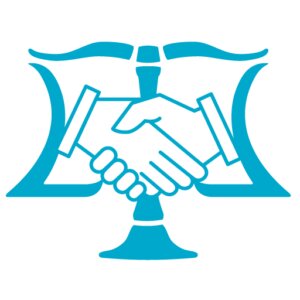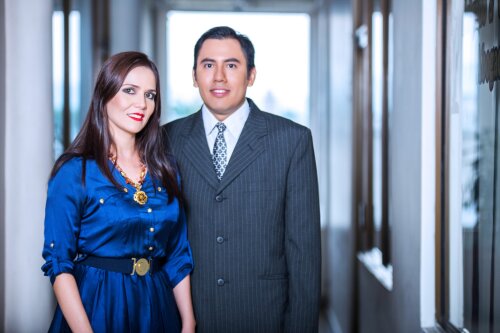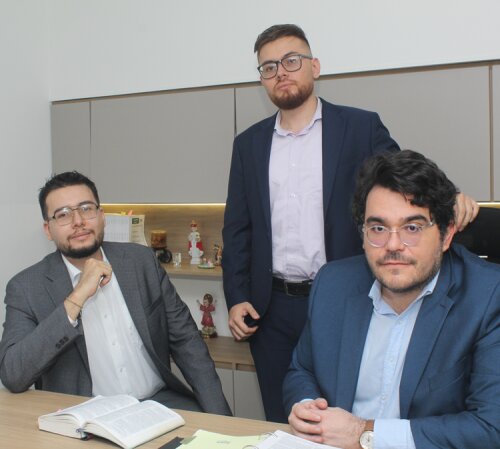Best Disability Lawyers in Bucaramanga
Share your needs with us, get contacted by law firms.
Free. Takes 2 min.
List of the best lawyers in Bucaramanga, Colombia
About Disability Law in Bucaramanga, Colombia
Disability law in Bucaramanga is part of the broader framework of Colombian national legislation aiming to protect the rights and dignity of people with disabilities. Individuals with disabilities have legal protections regarding healthcare, public accommodation, education, transportation, and employment. Bucaramanga, as a major city in Colombia, follows these regulations and implements local policies to enhance accessibility and inclusion. Efforts have been taken to ensure equal opportunities for participation in society and reduce discrimination against people with disabilities.
Why You May Need a Lawyer
While Colombian law provides several protections and guarantees for people with disabilities, challenges may arise in accessing these rights. You may need a lawyer in the following common situations:
- Facing discrimination at work or in applying for a job due to a disability
- Having trouble accessing public spaces or transportation that should be adapted for people with disabilities
- Being denied admission or accommodations by educational institutions
- Encountering barriers to healthcare or rehabilitation services
- Problems enrolling in or receiving state benefits and social security programs designed for people with disabilities
- Needing to appeal rejected claims for disability pensions or other social support
- Experiencing challenges in executing or defending your legal rights regarding accessibility, guardianship, or autonomy
A lawyer specializing in disability cases can provide guidance, represent you before institutions or the courts, and help ensure your rights are fully protected.
Local Laws Overview
The legal framework for disability in Bucaramanga is based on both national and municipal regulations, including:
- Law 1346 of 2009 - Ratifies the United Nations Convention on the Rights of Persons with Disabilities, making its principles binding in Colombia.
- Law 1618 of 2013 - Establishes specific measures to guarantee the full exercise of rights for people with disabilities.
- Law 762 of 2002 - Approves the Inter-American Convention on the Elimination of All Forms of Discrimination Against Persons with Disabilities.
- Decree 1660 of 2003 - Regulates education access for people with disabilities.
- Municipal ordinances and agreements in Bucaramanga promoting inclusion and setting standards for accessible infrastructure, public transportation, and social programs.
Key local policies focus on accessibility in public spaces, inclusive education, fair employment practices, social security, healthcare access, and nondiscrimination in day-to-day interactions and institutional settings.
Frequently Asked Questions
What is considered a disability under Colombian law?
A disability refers to any long-term physical, mental, intellectual, or sensory impairment that, in interaction with various barriers, may hinder a person's full and effective participation in society on an equal basis with others.
Does Bucaramanga provide any local programs for people with disabilities?
Yes, Bucaramanga has local programs aimed at social inclusion, rehabilitation, education, and accessibility. The mayor's office and the municipal secretary for social development often coordinate these programs.
Can I receive disability benefits or a pension?
People with recognized disabilities may qualify for benefits such as disability pensions, financial assistance, or healthcare subsidies. The process involves assessment by social security or local government authorities.
Are all public buildings and transportation systems accessible?
While efforts have been made to enhance accessibility, not all facilities are fully adapted. The law requires public and private entities to remove architectural barriers, but implementation can vary. You can file complaints if accessibility standards are not met.
What rights do disabled students have in education?
Students with disabilities have the right to inclusive education and reasonable accommodations. Schools and universities must provide support services and cannot deny admission based on disability status.
Can I take legal action if I am discriminated against at work?
Yes, Colombian labor law prohibits discrimination against people with disabilities regarding hiring, promotions, workplace conditions, and dismissal. You can file a complaint, and a lawyer can help guide you through the process.
How do I prove my disability for legal or administrative purposes?
You generally need a medical evaluation and certificate issued by an authorized health professional or institution. This documentation supports legal claims and access to benefits.
What should I do if a benefit application is denied?
You have the right to appeal administrative decisions. A lawyer can assist in preparing the appeal, gathering evidence, and representing you before the relevant bodies or courts.
Are there free or low-cost legal services available?
Yes, you can seek assistance from legal clinics, ombudsman offices, and some nonprofits. These services help low-income individuals access the legal system.
Where can I report mistreatment or neglect of a person with a disability?
Mistreatment or neglect can be reported to the Family Commissariat, the Colombian Institute of Family Welfare (ICBF), or the municipal ombudsman. Police and judicial authorities can also be notified in cases of serious abuse.
Additional Resources
Several institutions provide support, information, or legal guidance to people with disabilities in Bucaramanga:
- Personería Municipal de Bucaramanga - Municipal ombudsman for legal advice and rights defense
- Defensoría del Pueblo - National Ombudsman’s Office
- Secretaría de Desarrollo Social de Bucaramanga - Implements inclusion and disability programs
- Instituto Nacional para Ciegos (INCI) and Instituto Nacional para Sordos (INSOR) - Guidance for people with visual or hearing disabilities
- Colombian Institute of Family Welfare (ICBF) - Especially relevant for children and families
- Legal clinics and university law faculties in Bucaramanga - Free or low-cost legal advice
- Nonprofit organizations dedicated to disability inclusion and legal support
Next Steps
If you believe your rights as a person with a disability have been violated, or you need guidance regarding benefits, accessibility, or legal representation, consider taking the following steps:
- Gather all relevant documentation, including medical records, correspondence, and any evidence related to your case.
- Contact the municipal ombudsman or a local legal clinic for an initial consultation, especially if you have limited resources.
- Consult a lawyer who specializes in disability law in Bucaramanga. They can help you assess your options and advocate on your behalf.
- If applicable, file a complaint or legal action through the relevant local authority, such as the laboral inspectorate, social welfare office, or a court.
- Stay informed about local programs or support groups that may help you navigate the system and advocate for your rights.
Acting quickly and with proper legal advice increases the likelihood of upholding your rights and obtaining the support or compensation you deserve. Remember, many resources exist in Bucaramanga to ensure people with disabilities can live with dignity, autonomy, and equality.
Lawzana helps you find the best lawyers and law firms in Bucaramanga through a curated and pre-screened list of qualified legal professionals. Our platform offers rankings and detailed profiles of attorneys and law firms, allowing you to compare based on practice areas, including Disability, experience, and client feedback.
Each profile includes a description of the firm's areas of practice, client reviews, team members and partners, year of establishment, spoken languages, office locations, contact information, social media presence, and any published articles or resources. Most firms on our platform speak English and are experienced in both local and international legal matters.
Get a quote from top-rated law firms in Bucaramanga, Colombia — quickly, securely, and without unnecessary hassle.
Disclaimer:
The information provided on this page is for general informational purposes only and does not constitute legal advice. While we strive to ensure the accuracy and relevance of the content, legal information may change over time, and interpretations of the law can vary. You should always consult with a qualified legal professional for advice specific to your situation.
We disclaim all liability for actions taken or not taken based on the content of this page. If you believe any information is incorrect or outdated, please contact us, and we will review and update it where appropriate.












